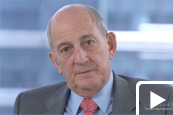About Us / History

video
Building a portfolio of giving
Charles Bronfman starts his foundation to give effectively to causes he cares about
The following document, co-authored by Andrea, z”l, and Charles Bronfman, was written in 1996 as part of a booklet in honor of the 10th anniversary of The CRB Foundation. This document contains the genesis of the values and principles that have served to guide The Andrea and Charles Bronfman Philanthropies.
The official birth date of The CRB Foundation was December 11, 1986. At that time, two principles that would guide the Foundation were announced:
The enhancement of Canadianism; and The unity of the Jewish people whose soul is in Jerusalem.
We had long discussed different areas of possible involvement, but had developed an abiding interest in these two. For the past nine years, they have guided the major part of our programming and no doubt will continue to do so in the future.
In 1981, I received the Order of Canada. While listening to the citations of the distinguished people receiving this same honor, I thought it was such a shame that, except for those in the room, few Canadians would ever know how many superb co-citizens they have.
Canada and Canadians have so few folk heroes. In fact, we seem to recognize few national heroes of any kind! Almost every country and every society has its heroes, but Canada, a country that lacked a flag for so long, has lacked heroes even longer. It logically followed that the enhancement of Canadianism would play a major role in the future of our proposed foundation.
During these discussions, we also spent considerable time reflecting upon the Jewish world, the re-birth and development of the State of Israel, the roles of our parents and our own work in this fascinating and compelling evolution. We agreed that, no matter where Jews lived, Israel was fundamental to our existence as a vital, vibrant people. That together, Israel and Diaspora Jews could make significant contributions to the improvement of humanity. We thus decided that the unity of the Jewish people whose soul is in Jerusalem would command significant attention.
Then came the task of translating these principles into meaningful programs. In 1985, we held a series of consultations. We called together key people from Israel, the United States and Canada who were active in these two fields. Through these consultations, we saw an opportunity to become proactive in many ways. Not for the sake of being proactive, but rather because it was the most practical way to activate our principles. We wanted to become the starting point, rather than relying on organization X, Y, or Z to propose ideas and hope they fit into some overall plan. We felt that we should begin with our own plan, tailor programming to further that plan, and then partner with agencies that have proven themselves in these fields.
Our programming naturally addressed itself to young people. If Canadianism could be meaningful, our youth would make it so. If there were to be unity among the Jewish people whose soul is in Jerusalem, it would be the young who would unite. Thus, one of our goals became to provide young people with strong roots in their culture and ties to their heritage in order for them to have confidence in the future. Others will address the specifics of the programs and the integration of the Foundation.
We have tried to instill sound business practices into the culture of the Foundation. The bottom line may be different than that of a company, but nonetheless there is a bottom line. We have been fortunate in finding partners for our major projects, which has made them so much more vital and effective.
We have learned that hard and fast rules can often hinder a foundation's progress rather than help it. Initially, we thought that strict time limitations for projects was mandatory. We soon found that, indeed, flexibility was much more important. Granted, we didn't want to be in any project forever, but the nurturing period between one and another can be, and is, very different. Nonetheless, exit strategies from a project are, while easy conceptually, difficult in practice.
Like all who engage in an enterprise, we try to assess our progress on an ongoing basis. It is only on rare occasions like this that one can look back and reflect on its relative success. Initially, we probably tried to do too much in each area, resulting in more projects but less overall results. We have since narrowed our sights and are happy that in a relatively short space of time several major programs have been initiated and have done extraordinarily well.
And as we think about the future of The CRB Foundation, we believe the groundwork that has been laid is solid. We are fortunate to work with dedicated colleagues who approach their tasks with tremendous enthusiasm. They and we, together, have taken on big issues. We have attracted significant additional investment from corporations, governments and other foundations. Their cooperation, financial and otherwise, has provided the leverage to increase the scope and reach of our major projects.
We anticipate that the future will be as exciting as our past. We are grateful to all who have played a role in establishing The CRB Foundation.
